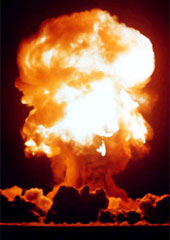Democracy Goes into Reverse
Western leaders more or less unthinkingly assume that democracy will eventually triumph worldwide. Are they correct?
April 6, 2013

For a time, the rosy predictions of global democratization seemed warranted. Political freedom indeed blossomed in a “fourth wave” of democratization in the developing world in the 1990s and the early part of this century.
The old great-power adversaries, the United States and Russia, worked together on challenges ranging from the first Gulf War to the safe decommissioning and storage of nuclear weapons.
While authoritarians still ruled most of Africa, Eastern Europe and Asia in 1990, by 2005 democracies had emerged across these continents, and some of the most powerful developing nations — including South Africa, South Korea and Brazil — had become solid democracies. By 2005, more than half the world’s people lived under democratic systems.
With the “color revolutions” in Georgia, Ukraine and Kyrgyzstan, the fall of Saddam Hussein, the overthrow of the Taliban, the apparent end of military interventions in Turkey, the stirrings of reform in small Persian Gulf nations like Bahrain and even a reformist presidency under Muhammad Khatami in Iran, the Middle East and Central Asia — long the exception to global democratic change — seemed ready to make the transition.
Yet Western leaders do not seem to recognize how seriously democracy is threatened in many parts of the developing world.
Some observers, like Freedom House, have begun to recognize how democracy has become endangered. But few have systematically traced how a form of government once thought to be invincible has been found lacking in so many places and consequently tossed aside, often by the very middle-class reformers who once were democracy’s vanguard.
This democratic decline is not concentrated in one region or one continent. Unlike previous waves of democracy regression, such as those occurring in the 1920s and 1930s, today’s decline includes a far wider array of nations, from more regions of the globe, and is much less likely to be stopped.
More important, many of the countries that are regressing from democracy are regional powers, including Russia, Kenya, Thailand, Argentina, Senegal, the Philippines, Hungary, Venezuela, Mexico, Nigeria, and many others. Their examples matter more to their regions than those of smaller, less influential states.
In many of these regionally important countries, the decline of democracy has been so sharp that it has shocked people who lived through the initial period of democratization.
In the Philippines in the 1980s, crowds of nonviolent Filipinos thronging Manila’s Edsa Avenue invented the “people power” movement. It inspired uprisings from the “color revolutions” in Eastern Europe and Central Asia to the Iranian Green Movement of 2009 and the Arab Spring of 2011, which swept through Egypt, Yemen, Syria and other nations.
Now, as one democratically elected Philippine government after the next becomes mired in corruption and self-dealing, Filipinos are increasingly disenchanted with democratic rule.
African nations that had made major progress in the previous decade also have regressed badly. Kenya is the wealthiest and most globalized in East Africa. After the rule of longtime dictator Daniel arap Moi, many people believed that Kenya would become a vibrant democracy, but it has collapsed into interethnic battles and newly repressive governments. This decline is being repeated in Nigeria, the most vital nation in West Africa.
In Uganda, Yoweri Museveni, who had amassed enormous popular goodwill for ending conflicts and rebuilding the economy after the disastrous regimes of Milton Obote and Idi Amin, had promised to serve only four years when he became president in 1986.
Yet he kept finding reasons to stick around, until he finally forced through a constitutional rewrite in 2005 that removed presidential term limits altogether. By 2011, after he won another term in a fraudulent election, his security forces had to repeatedly clear the streets of Kampala with massive shows of force.
Under Vladimir Putin and his protégé Dmitri Medvedev, Russia has discovered nostalgia for Soviet repression. In the 1990s, it had developed a vibrant media and a robust (if chaotic) democracy that provided an example to many other former Soviet states.
The last truly independent Russian political party, the Union or Right Forces, merged with pro-Kremlin parties several years ago, leaving virtually no opposition in the Duma.
In Asia, other supposed success stories have regressed as well. The Malaysian government had once vowed to uphold total freedom for online media in order to promote the country as a high-tech hub. However, it began developing new ways to censor both the print and the online media.
Meanwhile, the late Hugo Chavez of Venezuela, like former Thai Prime Minister Thaksin Shinawatra an elected leader with little dedication to constitutionalism or the rule of law, pushed his “Bolivarian revolution” closer to outright authoritarianism, as has Evo Morales in Bolivia and Peruvian president Ollanta Humara.
Despite the democratic recession of recent years and the destructive impact of the global economic crisis on democracy, even today most Western leaders more or less unthinkingly assume that democracy will eventually triumph worldwide.
To understand the international system, we have to ask why many established democracies, including the United States and emerging powers like South Africa and Brazil, have abandoned democracy promotion and human rights advocacy.
Indeed, with authoritarian states like China wielding more power and with established democracies in the West and the developing world reluctant to stand up for their values or pursuing democracy promotion strategies that too often focus on rhetoric, elections and process, the international environment has become far more complicated and challenging for democracy in the new millennium.
Editor’s note: This article is adapted from Democracy in Retreat: The Revolt of the Middle Class and the Worldwide Decline of Representative Government (Yale) by Joshua Kurlantzick. Published by arrangement with the author and Yale University Press. Copyright © 2013 by Joshua Kurlantzick.
Takeaways
Western leaders do not seem to recognize how seriously democracy is threatened in many parts of the developing world.
Few have systematically traced how democracy has been tossed aside by the very middle-class reformers who once were its vanguard.
Today's decline in democracy includes a far wider array of nations from more regions of the globe and is much less likely to be stopped.
With established democracies in the West reluctant to stand up for their values, the international environment is far more complicated for democracy.
Read previous

How Israel Helped a Rogue State Go Nuclear
April 5, 2013
